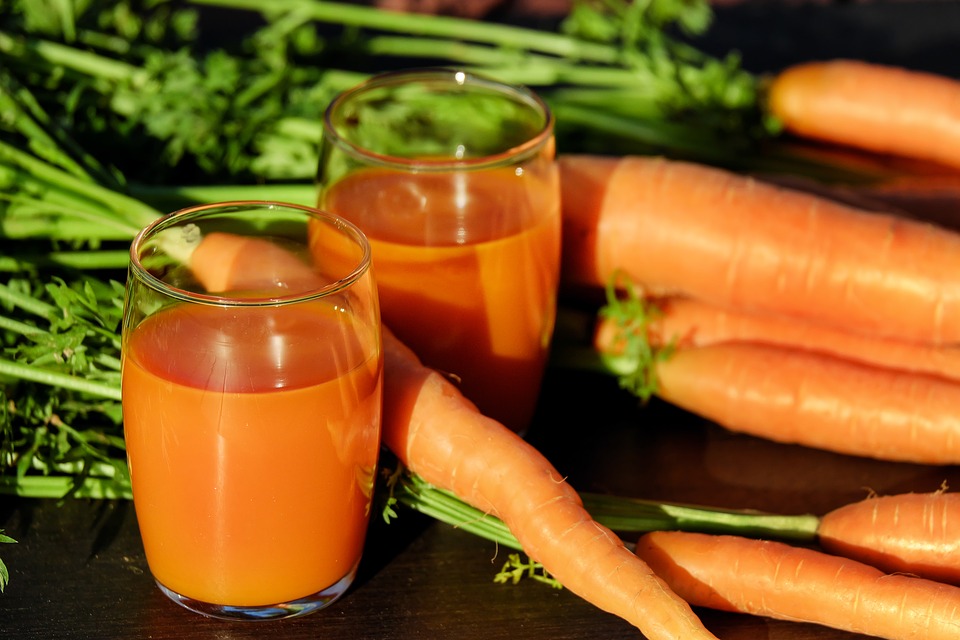 Juicing has gained attraction as a health craze for a few years now. One of the most popular vegetables to juice is the carrot. Naturally sweet and visually stunning, carrot juice also contains less than 100 calories, 2 g protein, 2 g fiber, potassium, vitamin C, vitamin A, and vitamin K (in one cup of juice). Not only is it packed with nutrition, it’s also associated with reduced risk of certain cancers, which can make it seem like the perfect food. But is it?
Juicing has gained attraction as a health craze for a few years now. One of the most popular vegetables to juice is the carrot. Naturally sweet and visually stunning, carrot juice also contains less than 100 calories, 2 g protein, 2 g fiber, potassium, vitamin C, vitamin A, and vitamin K (in one cup of juice). Not only is it packed with nutrition, it’s also associated with reduced risk of certain cancers, which can make it seem like the perfect food. But is it?
Fruit and vegetable juices that are fresh squeezed and not pasteurized can pose a risk of germ contamination. Germs can get into the juice from the skin of the fruits and vegetables or grow from cross contamination. This can pose a risk for those who are immune compromised, such as someone fresh out of surgery, those receiving cancer treatment, pregnant women, elderly, and even children. Although not harmful, eating a large amount of foods high in beta carotene (which converts to vitamin A) over time can make skin turn a yellow-orange color.
There is no denying that carrot juice is packed with vitamins and minerals. In fact, one cup of carrot juice has the vitamin and mineral content of 5 cups of raw carrots. However, carrot juice has less fiber and more sugar per cup than it’s fresh vegetable counterpart. Eating foods higher in fiber leads to feeling fuller for longer. Consider how long it would take you to drink one cup of juice compared with eating one cup of raw carrots. The lack of chewing make the juice go down much faster. That may be good in a pinch or if you have a toothache, but otherwise you are better off eating the actual vegetable. The crunch of eating a carrot also contributes to feeling more satisfied and is better for your teeth.
So, what’s the bottom line? For weight loss patients, especially surgical weight loss like gastric sleeve, gastric bypass, and gastric band, carrot juice is OK in moderation, but it shouldn’t be made into a lifestyle. Eating the carrot is a much better choice for fewer calories, less sugar, more fiber, and to help you feel fuller for longer, all of which help contribute to weight loss. Even in the early stages of your bariatric post op diet, pureeing the carrot would be a better choice than juicing it as the fiber would remain. As a general rule, choose the fruit or vegetable over the equivalent juice.
The above is offered by Dr. Shillingford, MD, PA, a board certified surgeon specializing in advanced and robotically controlled laparoscopic surgery, as well as bariatric surgery including gastric sleeve, gastric bypass, and lap band surgery. Dr. Shillingford has performed over 4,000 bariatric procedures while offering the highest level of care. His bariatric weight loss patients come from all over Florida, including Miami, Boca Raton, Orlando, Fort Lauderdale, and Jacksonville, to feel confident that they are in good hands in Northwest Medical Center’s Center of Excellence in Bariatric Surgery, where staff is specially trained in caring for bariatric patients. Follow up care is provided in Dr. Shillingford’s Boca Raton office or can be arranged differently for patients who traveled for their surgery. To inquire more about whether bariatric surgery is right for you, call Dr. Shillingford at (561) 483-8840 for an appointment.

 Am I A Candidate
Am I A Candidate  BMI Calculator
BMI Calculator  Why Choose Us
Why Choose Us